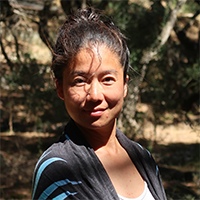Tom Howard/John H. Reid Fiction & Essay Contest 2025
Congratulations to the winners of the 2025 Tom Howard/John H. Reid Fiction & Essay Contest!
Honorable Mention $500
- Paul Curley, Dogs Don’t Know About Fallujah, Fiction
- Joan Dempsey, Wild Swan, Fiction
- Lucinda Dhavan, In Paradise, Fiction
- Aria Dominguez, Architectural Plans, Nonfiction
- Martha Grace Duncan, So Have I Been a Good Stepmother?, Nonfiction
- Katherine Dykstra, All Girls, But One, Nonfiction
- Doug Emory, Perfect, Nonfiction
- Robin Hirsch, Shakespeare, Nonfiction
- Steven R. Perez, Process: An Excerpt, Nonfiction
- R.L. “Pete” Peterson, Grandma’s Way, Fiction
- Patricia Schultheis, When Sister Joan Opens the Door, Fiction
- Christy Tending, An Ornithology of Grief, Nonfiction
In our 2025 contest, 1,757 entries were judged by Mina Manchester with screening assistance from Sarah Halper. Ms. Manchester shares her thoughts below.
In this year's Tom Howard/John H. Reid Fiction & Essay Contest, the stories and essays grapple with time-honored questions—chief among them, how to handle change and how to deal with loss.
In fiction, the First Prize Winner, Shelby Stewart's "Going and Going and Going", shares how experiencing a devastating loss over the period of year, with the illness and death of a beloved older sister to swift-moving cancer, creates waves that wrack the loved ones left alive. What is so moving about this story is how the sister's love tries to shield her family and loved ones from grief even before she's gone.
Honorable Mentions in fiction explore similar themes, pondering how to help those we love. In stories about a woman wrestling with taking in her half-brother even when her father abandoned her, to a grandmother trying to help her grandson start a new life after losing his mobility to an IED attack in Afghanistan, these writers share how love can lead the way. Stories also wonder about our duty to those in our community and how to help others thrive. In one piece, a nun offers safe harbor to a recovering addict in New Mexico, while in another, a newly single father tries to understand and shepherd his autistic daughter's passage in the world while also offering his porch to a young, unhoused veteran. In another work, a group of lifelong friends in a small town watch a treasured monument be reconstructed and offer insight into the specific experiences that bring us collective joy and wonder. While the topics and narratives themselves differ greatly and provide many lenses to view the world around us, they also expose singular musings into what can be done in the realm of the everyday.
Fiction Honorable Mentions went to:
- Paul Curley, "Dogs Don't Know About Fallujah"—This is such a great example of a story that contains multitudes and still manages to keep a narrative throughline. A recently separated man tries his best to parent his sixteen-year-old autistic daughter while squirrels and an unhoused veteran threaten to take over his house. Along the way it underscores the lengths a parent will go to for their child, and how sometimes we are all faced with impossible and seemingly contradictory choices.
- Joan Dempsey, "Wild Swan"—A group of senior men in a small town wrestle with their decades-old friendship and stewardship of their community, while mourning all of the losses that life brings and pondering the exceptional experiences that still fill us with wonder, no matter our age.
- Lucinda Dhavan, "In Paradise"—At a scenic wedding for a friend, a photographer is exposed to the intimacies between the bride and her family. While witnessing her friend's sorrow at how these relationships will inevitably change with her impending marriage, the photographer must decide if she will take in her half-brother, even though her father was not there for her when she needed him most. The tension in this story comes from the photographer being up against a deadline, and the arc of the story is around what she learns about herself, and how she wants her family to reflect what her heart desires most.
- R.L. "Pete" Peterson, "Grandma's Way"—After a horrific IED attack in Afghanistan lands him in a wheelchair, a man returns to the grandmother who raised him, and fights a new battle, this time over how to stay alive in his new reality. Interspersed with his grandmother's advice and wisdom, this story reveals how those who know us best are often those who lead us back to ourselves.
- Patricia Schultheis, "When Sister Joan Opens the Door"—During a routine day at a moving company, an interaction with a collective of nuns proves to be anything but. A group of recovering addicts must face their future and decide if a change of scenery and opening themselves up to the care of a new community will give them the support they need to stay sober and start over.
The First Prize winner in nonfiction, Bea Chang's essay "Requiem for a Bubble Tea", weaves a sensory tale of gastronomic delights and seeks to get at the root of the nostalgic impulse that drives us to remembered tastes. What strikes me most about this essay is how food is intrinsically linked to culture, and how with time and the passing of generations, culture is altered and inevitably pieces are lost. This piece captures perfectly the longing for a particular taste and how the emotions it stirs bring us closer to who we are. The genius of it, however, captures how imperfectly we are ever able to duplicate a taste, or emotion, and how our relationships to our families and ourselves are always changing and impermanent, even in memory.
Nonfiction Honorable Mentions dwell on how to process losing the life you wanted and making the best of the one you have. A new mother grieves the death of her own mother while recounting the lessons she taught her and how to pass them on. A restaurant manager bonds with an unhoused man over not what sets them apart but what brings them together—Shakespeare, of all things. In another essay, a woman tries to reconcile the lasting effect of a magnetic friend while mourning the end of the relationship. Other essays discuss the unbearable day-to-day suffering that comes with caring for a young child with cancer, and the philosophy one prisoner fashions for himself to survive incarceration. Two other essays bring us into the world of losing a dream long deferred. In one, a couple's dream ends before it's realized when they must abandon their dream home in Costa Rica for cancer treatment in the US. In the second, a woman's quest for answers turns into providing them for someone else, whose suffering has outmatched her own.
Nonfiction Honorable Mentions went to:
- Aria Dominguez, "Architectural Plans"—What do we do when the dream for our life is rerouted? In this essay, a couple is forced to abandon building the dream home they've always wanted in the husband's home country of Costa Rica, when he must return to America for cancer treatment.
- Martha Grace Duncan, "So Have I Been a Good Stepmother?"—This essay covers the difficult terrain of a woman searching for her stepmother three decades later to understand her father's death by suicide. She recounts the abject poverty, implied drug abuse, and poor physical and mental health of the woman who views herself as her stepmother during the single visit she makes. Along the way, she discovers that although she was the one seeking answers, she is inexplicably in the position to offer them.
- Katherine Dykstra, "All Girls, But One"—We have all had that one friend who is so bewitching, and left such a deep imprint, we've never been the same. This unique essay chronicles the origins and pull of such a powerful and life-altering friendship and meditates on how the spell cast on us by others changes our story, too.
- Doug Emory, "Perfect"—This work of nonfiction moves with the tension and power of a train going full speed ahead. Chronicling the excruciating experiences of a father caring for a child with cancer, it reveals how the most mundane experiences are the ones that matter most.
- Robin Hirsch, "Shakespeare"—This essay sets itself apart as I've never read a story about someone showing so much love and kindness and taking such good care of someone who is unhoused. While making a man breakfast and letting him use the facilities of his restaurant to clean up, they bond over Shakespeare and the well-worn truths those works share about our common humanity.
- Steven R. Perez, "Process: An Excerpt"—This excerpt from an incarcerated man moved me, not only with detail about life behind bars and the attendant feelings of being locked away and withheld from society, but also in its learned philosophy that things can always be worse, and sometimes are, and that despite suffering on a daily basis we can be grateful that life keeps going no matter your circumstances.
- Christy Tending, "An Ornithology of Grief"—An absolutely beautiful, stunning rumination on grief. Told through the lens of the birds whose names her mother taught her, a daughter reflects on the gifts her mother gave her and her desire to impart them to her own children.
Each of these stories and essays offers a different take on what it means to live with loss, and how to find what it takes to keep going. This is the strength of great literature, to provide glimmers of understanding, to help us make sense of both the everyday obstacles and the grand tragedies of our lives. I trust the words of these writers will help you probe the depths of your own understanding and see a little more clearly the narrative of your own life.
We would like to recognize these additional fourteen finalists for their outstanding works: Raia Small, "Predators"; Jaime Gill, "People You May Know"; Timothy Hedden, "Life Sentence"; Minna Horak-Hult, "Worms & Dirt"; Stephanie Green, "Atlantic Majesty"; Ariana Kelly, "Stray"; Aimee Newsom, "When the Ice is Solid Tig and Her Father Skate Down the Kennebec"; Chad Fore, "Even if You Killed Someone"; Kimberly Burge, "Alongside"; Maria Olujic, "The Stone that Doesn't Fall"; Emily Mathis, "Men Smoking"; Gordon Portman, "Ruth"; Althea Kriney, "The Bottom"; and Jennifer Tubbs, "The Rat Room".
See the press release announcing the winners.
Learn more about our current Tom Howard/John H. Reid Fiction & Essay Contest.
Contest Judges

Mina Manchester
Mina Manchester is a past final judge of our Tom Howard/John H. Reid Fiction & Essay Contest. She is a Scandinavian-American writer chasing the sun in Los Angeles. An editorial assistant at new independent publisher Great Place Books, she holds an MFA from the Sewanee School of Letters. Her work has been featured in Electric Literature, The Evergreen Review, Columbia Journal, The Normal School, Inscape, HuffPost, and elsewhere. She's been a Finalist for The Masters Review Short Story Award, the Pinch Literary Award, the Annie Dillard Award in Creative Nonfiction, the Rick DeMarinis Short Story Award, honored by New Millennium Writings, and nominated for the UCLA James Kirkwood Prize. A former editor-at-large for Five South and assistant editor for Narrative Magazine, her workshop experience includes The Kenyon Review Writing Workshop, The Writer's Hotel, and Narrative's Art of the Story.
Photo by Emma Burdett
Contest Judges

Sarah Halper
Sarah Halper is an assistant judge of our North Street Book Prize and our Tom Howard/John H. Reid Fiction & Essay Contest. She earned her undergraduate degree in English History and Literature at Harvard and her graduate degree at The MFA Program for Writers at Warren Wilson College.









